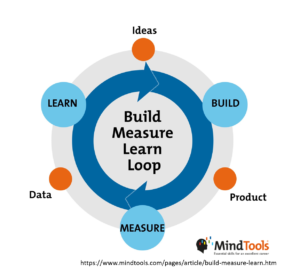A decade ago, the Lean Startup movement generated much buzz in the startup world and companies and entrepreneurship curricula began integrating this alternative startup approach into their processes and materials. The Lean Startup method, pioneered by Steve Blank and Eric Ries, encourages founders to take an action-oriented, quick and cheap approach to starting a business. Previously, the startup process consisted of writing a business plan, pitching it to investors, assembling a team, creating your product and selling it to the best of their ability. In a study conducted by the Harvard Business Review in 2013, about 75 percent of startups who largely followed this conventional approach failed.
In contrast, the lean startup process offers a cost-effective alternative. It favors experimentation over big design upfront development. In short, founders turn their idea into a “minimally viable product” (MVP) and test them out on potential customers. Depending on the feedback, they either “pivot” and modify their MVP, or they move forward with a validated customer market. This process continues until they achieve the right product-market fit and there is an established demand for the product/service. The Lean Enterprise Institute describes the methodology as “maximizing customer value while minimizing waste”.
So, how can you incorporate lean methodology into your new or established business enterprise?
- Put systems in place to collect feedback from your customers – ask them what they like and don’t like about your product/service. Incorporate this feedback into your business!
- Revisit your company’s original problem and “value proposition”. Are you solving a real problem that your customers can feel?
- Build a customer persona. Describe your ideal customer by giving them a name and listing their motivators, behaviors, wants, values, etc. Giving a face to your customer makes it easier to guide business decisions by thinking about your “John Smith” will react. Note: You may have different customer segments and a persona for each segment.
- Use quality software and Customer Relations Management platforms to track performance and efficiency.
- Adopt a culture of continuous improvement.
- Find a mentor or support team who can share their expertise in and experience with lean methodology.
- Outsource. Outsourcing is the key to a successful company. Free up time by outsourcing work that is not your strong suit, such as accounting or legal issues.
At the UMW CED, we recognize the great value of the lean startup principles, and we teach it in our entrepreneurship curricula. To learn more and get your specific questions answered, reach out to your consultant or request an appointment.